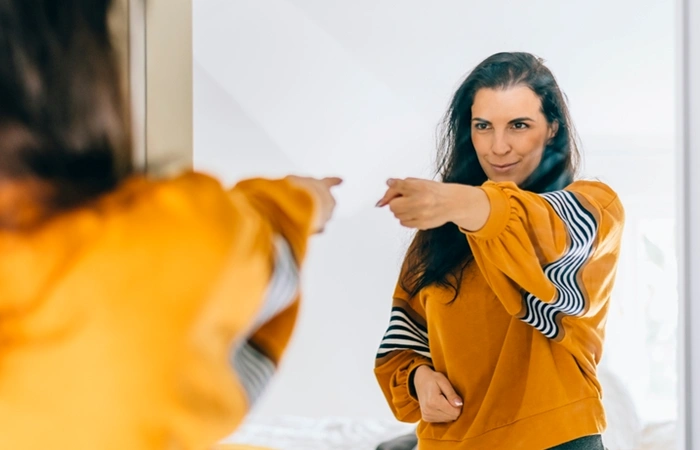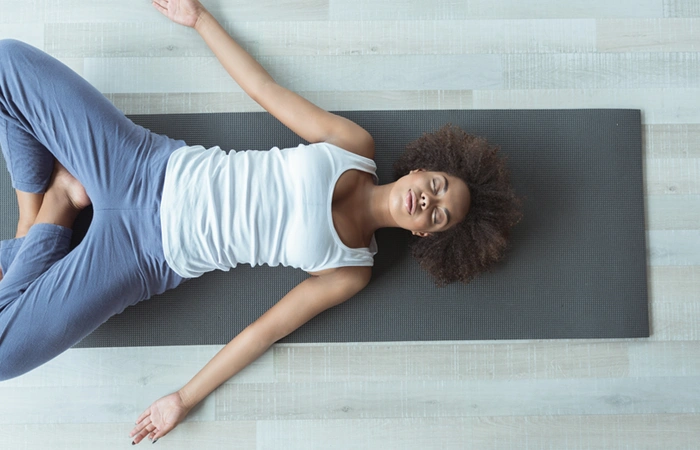Feel More Confident in Your Own Skin
Self-confidence isn’t necessarily something that you’re born with. You can also develop self-confidence through daily practice and forming healthy habits. If you’re not sure how to get started with feeling more confident in your skin, here are 11 suggestions to help you get started:
Table of Contents
Create a regular self-care routine.
Self-care looks different for everyone: Some people love going for a long run, while others prefer doing a luxury skincare routine. Figure out what self-care makes you feel good about yourself boosts your self-confidence and incorporate more of those activities into your daily and weekly routine. Not only will these activities make you feel better, but they will show you that you’re worth spending time on.
Take time off from social media.
Social media is a huge source of comparison and stress for many people. If you find yourself scrolling through social media, comparing yourself negatively to other people, then it might be time to limit your time or even fully step away for a while. You can set daily timer limits for each app, or delete the apps off your phone completely. You might also want to go through the accounts that you are following and unfollow or mute any accounts that make you feel less confident.

Watch what social media you consume.
Social media isn’t the only type of media that can make us feel bad about ourselves: TV, movies, magazines, books, and even podcasts can all do the same. Pay attention to what media you are consuming and how it makes you feel about yourself. If you notice that what you’re watching or reading is impacting your confidence negatively, then seek out media that has more positive messages.
Evaluate your friend group.
Your friends should lift you up, not tear you down. If your friend group frequently engages in backbiting, gossip, and insults, then you might want to consider distancing yourself from them and finding a new friend group. It can be daunting to think about finding new friends as an adult, but if your so-called “friend” group is making you feel worse about yourself, then they’re not being very good friends.
Practice awareness of your inner voice.
Everyone has some kind of inner voice that offers commentary on their lives. Even if it’s not a constant monologue, that inner voice can still have a huge effect on how you view yourself. Practice awareness of your inner voice and notice how you talk to yourself in different situations. For instance, maybe you are unkind to yourself about food or exercise but you compliment yourself frequently at work, or perhaps your negative self-talk gets triggered by certain friends or TV shows.

Change your negative self-talk.
Once you’ve developed an awareness of your inner voice and your patterns of thought, you can work on changing the negative self-talk into something more neutral or even positive. Do nice things for yourself and practice compassion and self-love when that mean voice starts to talk to you. If you find yourself spiraling and unable to direct your thoughts, doing an activity that occupies your mind as well as your body can help you redirect your thoughts.
Accept that you aren’t perfect.
Everybody has their own set of strengths and weaknesses, and accepting that you aren’t perfect is the foundation of self-confidence. If trying to accept all of your weaknesses at once sounds too overwhelming, then practice self-acceptance in one area of your life at a time. Start with something that feels small and manageable to you, and then work your way up to bigger things. As your self-acceptance grows, you will free yourself from perfectionism and be able to focus on being your best self.
Work on personal issues.
Accepting your weaknesses doesn’t mean repressing your personal issues and never addressing them. If you have something in your life that is making you feel stuck — whether that’s a rocky romantic relationship, a stressful job, or past trauma — then working through it can make you feel less burdened and more confident. Many resources can help, including life coaches, career coaches, therapists, and support groups.

Take care of your body.
Taking care of your body can take many different forms and even change from day to day. For instance, one day you might eat a salad one day and the next you cheer yourself up with a piece of cake. Or you might do a 10-step skincare for redness routine one night and then only use a facial cleanser and a moisturizer the next day because you’re feeling tired. Tune into your energy and mood and ask yourself what your body needs that day.
Don’t rely on validation from others.
If you are a people pleaser who thrives on other people’s validation, then you’re not living your life for yourself; you’re living it for other people. This can make you feel very uncomfortable in your own skin and push you into a life you don’t really want because you’re trying to fulfill other people’s expectations of you. Instead of relying on compliments and likes from other people, seek out validation from yourself and prioritize your own happiness.
Watch out for toxic positivity.
Toxic positivity involves suppressing all negative thoughts or feelings and only thinking positive thoughts. Bad things happen in life, and it’s normal to feel sad or angry about them. If you beat yourself up whenever you have a negative thought, or your friends shut down conversation about heavy topics, then you might be surrounded by toxic positivity. Being self-confident isn’t about being positive all the time; it’s about being a holistic, well-grounded person who’s in touch with all of their feelings, not just the happy ones.
What are some other things that you do to help yourself feel more confident? Let us know in the comments below!
